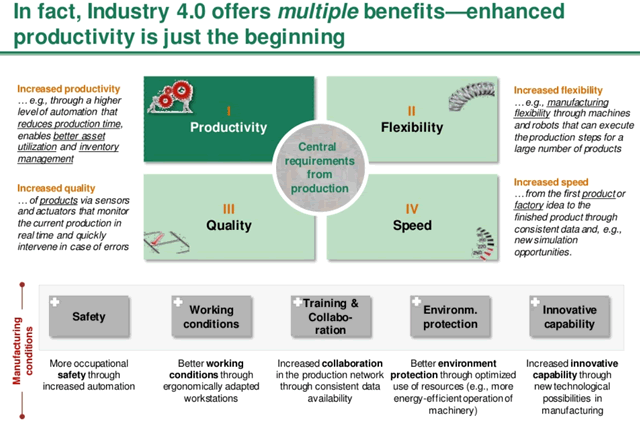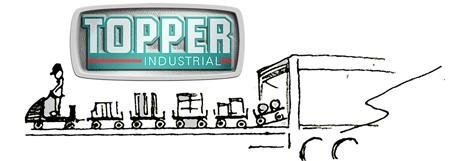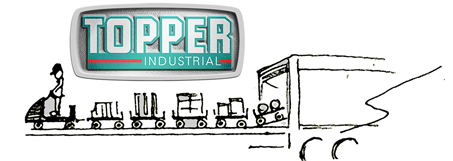Industry 4.0 and the intersection of Fork Truck Free (FTF) initiatives represent a generational shift. The engineering foundation of migrating from a fork truck material flow to FTF operational efficiencies is represented by Topper Industrial founder Ed Brown and son Ryan Brown, President of the Wisconsin-based industrial cart FTF revolution.

While productivity, throughput, and operational efficiency are an obvious outcome of FTF initiative, the prognosis of Industry 4.0 to transform manufacturing operations far exceed the initial benefits of productivity. Flexibility, quality, and speed are natural consequences achieved as organizations use FTF initiatives to become best-practice manufacturers.
How Industry 4.0 and FTF Driving Safety

Manufacturing plants operating under Industry 4.0 and FTF principles presents an opportunity for dramatic safety improvements if handled correctly. Reconfiguration of production areas at short notice, involving the rapid changes of tooling and even the physical movement of equipment, can pose a range of safety challenges. Each new production configuration entails a separate risk and safety assessment.
A range of devices can be fitted onto equipment capable of detecting and reporting operator behavior which may pose a risk to safety. This equipment can take a number of forms; among the most common are intelligent cameras which gather digital images or footage and pass these to a central control point, automatically highlighting any abnormal behaviors such as entry into a restricted area. Many systems designers also opt to equip their machines with safety sensing devices which can immediately sense if a human operator has moved into an unsafe area or positioned themselves too close to a particular piece of plant. The default response is usually to power down the machine or, in the case of a collaborative robot, to slow down to a safe speed, allowing the individual time to move away from the hazard. In the case of carts, these calculations are embedded in the design to ensure a runaway cart cannot happen.
With the single largest cause of injury on a manufacturing plant floor being a fork truck, reducing or eliminating this machinery may prove the most efficacious solution to safety improvement metrics. Bringing human performance and safety into the mix can extend situational awareness beyond the knowledge of assets and equipment and a person’s geo-location and skillset. Industry 4.0 combined with FTF enables operational decision-makers to executive optimal safety behaviors.
New Industry 4.0 predictive analytics include self-assessments which offer the means to predict injury. Rapid advances in wearable sensor technologies provide for the collection of physiological data. Pioneers in behavioral authentication are using data to understand normal range of motion – inertial signature – to provide a factor of authentication. Topper Industrial has taken early stage Industry 4.0 data and quantified improved human performance, ensuring that safety is enhanced, danger reduced by safeguarding against indicators of fatigue or identification of the emergence of an injury.
While fork trucks have been the machinery causing the most harm on a manufacturing plant floor, new Industry 4.0 metrics now overlay physiological and biomechanical data with workplace data (hours worked, tasks conducted, welfare records, etc.) and run advanced analytics incorporating machine learning, and allow floor supervisors to recognize when floor workers are reaching a point of physical or mental harm.
Topper Industrial will be at ProMat in Chicago Booth # S4812 from April 8 – 11.
About Topper Industrial
For more than twenty years, Topper Industrial, (www.topperindustrial.com) has been a leading manufacturer of material handling carts and equipment solutions. Topper Industrial designs and builds industrial delivery carts, cart lifts, lifts & tilts, material handling racks, steel containers, casters, tube & joint and industrial cart parts & components. Topper Industrial specializes in services to Manufacturing, Fulfillment, Warehousing and the Distribution Sectors. Topper Industrial’s services include, but are not limited to: Design & customization, manufacturing & production, site analysis & planning and implementation justification. Topper’s material handling solutions make delivering material line side more effective through more efficient practices.
Topper Industrial is a proud member of MHI. Follow on Twitter @TopperInd or on LinkedIn.

